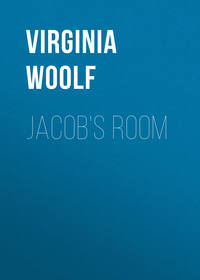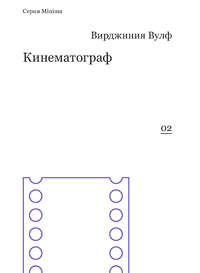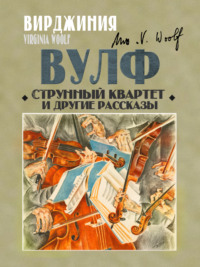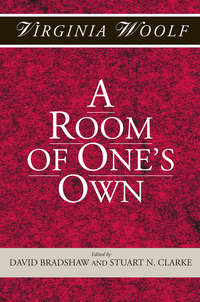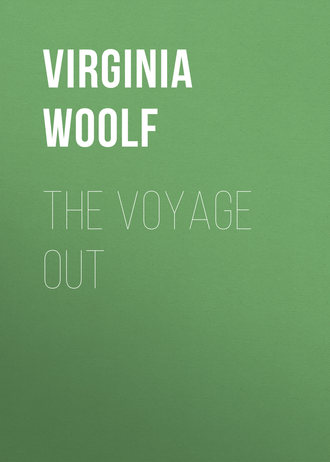 полная версия
полная версияThe Voyage Out
There was a pause, which was decidedly uncomfortable. Mrs. Dalloway then gave a little shiver, and asked whether she might have her fur cloak brought to her. As she adjusted the soft brown fur about her neck a fresh topic struck her.
"I own," she said, "that I shall never forget the Antigone. I saw it at Cambridge years ago, and it's haunted me ever since. Don't you think it's quite the most modern thing you ever saw?" she asked Ridley. "It seemed to me I'd known twenty Clytemnestras. Old Lady Ditchling for one. I don't know a word of Greek, but I could listen to it for ever – "
Here Mr. Pepper struck up:
πολλἀ τἀ δεινά, κοὐδἑν ἀν-θρώπου δεινότερον πέλει.τοῦτο καί πολιοῦ πέρανπόντου χειμερίῳ νότῳχωρεῖ, περιβρυχίοισιπερῶν ὑπ´ οῐδμασιMrs. Dalloway looked at him with compressed lips.
"I'd give ten years of my life to know Greek," she said, when he had done.
"I could teach you the alphabet in half an hour," said Ridley, "and you'd read Homer in a month. I should think it an honour to instruct you."
Helen, engaged with Mr. Dalloway and the habit, now fallen into decline, of quoting Greek in the House of Commons, noted, in the great commonplace book that lies open beside us as we talk, the fact that all men, even men like Ridley, really prefer women to be fashionable.
Clarissa exclaimed that she could think of nothing more delightful. For an instant she saw herself in her drawing-room in Browne Street with a Plato open on her knees – Plato in the original Greek. She could not help believing that a real scholar, if specially interested, could slip Greek into her head with scarcely any trouble.
Ridley engaged her to come to-morrow.
"If only your ship is going to treat us kindly!" she exclaimed, drawing Willoughby into play. For the sake of guests, and these were distinguished, Willoughby was ready with a bow of his head to vouch for the good behaviour even of the waves.
"I'm dreadfully bad; and my husband's not very good," sighed Clarissa.
"I am never sick," Richard explained. "At least, I have only been actually sick once," he corrected himself. "That was crossing the Channel. But a choppy sea, I confess, or still worse, a swell, makes me distinctly uncomfortable. The great thing is never to miss a meal. You look at the food, and you say, 'I can't'; you take a mouthful, and Lord knows how you're going to swallow it; but persevere, and you often settle the attack for good. My wife's a coward."
They were pushing back their chairs. The ladies were hesitating at the doorway.
"I'd better show the way," said Helen, advancing.
Rachel followed. She had taken no part in the talk; no one had spoken to her; but she had listened to every word that was said. She had looked from Mrs. Dalloway to Mr. Dalloway, and from Mr. Dalloway back again. Clarissa, indeed, was a fascinating spectacle. She wore a white dress and a long glittering necklace. What with her clothes, and her arch delicate face, which showed exquisitely pink beneath hair turning grey, she was astonishingly like an eighteenth-century masterpiece – a Reynolds or a Romney. She made Helen and the others look coarse and slovenly beside her. Sitting lightly upright she seemed to be dealing with the world as she chose; the enormous solid globe spun round this way and that beneath her fingers. And her husband! Mr. Dalloway rolling that rich deliberate voice was even more impressive. He seemed to come from the humming oily centre of the machine where the polished rods are sliding, and the pistons thumping; he grasped things so firmly but so loosely; he made the others appear like old maids cheapening remnants. Rachel followed in the wake of the matrons, as if in a trance; a curious scent of violets came back from Mrs. Dalloway, mingling with the soft rustling of her skirts, and the tinkling of her chains. As she followed, Rachel thought with supreme self-abasement, taking in the whole course of her life and the lives of all her friends, "She said we lived in a world of our own. It's true. We're perfectly absurd."
"We sit in here," said Helen, opening the door of the saloon.
"You play?" said Mrs. Dalloway to Mrs. Ambrose, taking up the score of Tristan which lay on the table.
"My niece does," said Helen, laying her hand on Rachel's shoulder.
"Oh, how I envy you!" Clarissa addressed Rachel for the first time. "D'you remember this? Isn't it divine?" She played a bar or two with ringed fingers upon the page.
"And then Tristan goes like this, and Isolde – oh! – it's all too thrilling! Have you been to Bayreuth?"
"No, I haven't," said Rachel. `"Then that's still to come. I shall never forget my first Parsifal– a grilling August day, and those fat old German women, come in their stuffy high frocks, and then the dark theatre, and the music beginning, and one couldn't help sobbing. A kind man went and fetched me water, I remember; and I could only cry on his shoulder! It caught me here" (she touched her throat). "It's like nothing else in the world! But where's your piano?" "It's in another room," Rachel explained.
"But you will play to us?" Clarissa entreated. "I can't imagine anything nicer than to sit out in the moonlight and listen to music – only that sounds too like a schoolgirl! You know," she said, turning to Helen, "I don't think music's altogether good for people – I'm afraid not."
"Too great a strain?" asked Helen.
"Too emotional, somehow," said Clarissa. "One notices it at once when a boy or girl takes up music as a profession. Sir William Broadley told me just the same thing. Don't you hate the kind of attitudes people go into over Wagner – like this – " She cast her eyes to the ceiling, clasped her hands, and assumed a look of intensity. "It really doesn't mean that they appreciate him; in fact, I always think it's the other way round. The people who really care about an art are always the least affected. D'you know Henry Philips, the painter?" she asked.
"I have seen him," said Helen.
"To look at, one might think he was a successful stockbroker, and not one of the greatest painters of the age. That's what I like."
"There are a great many successful stockbrokers, if you like looking at them," said Helen.
Rachel wished vehemently that her aunt would not be so perverse.
"When you see a musician with long hair, don't you know instinctively that he's bad?" Clarissa asked, turning to Rachel. "Watts and Joachim – they looked just like you and me."
"And how much nicer they'd have looked with curls!" said Helen. "The question is, are you going to aim at beauty or are you not?"
"Cleanliness!" said Clarissa, "I do want a man to look clean!"
"By cleanliness you really mean well-cut clothes," said Helen.
"There's something one knows a gentleman by," said Clarissa, "but one can't say what it is."
"Take my husband now, does he look like a gentleman?"
The question seemed to Clarissa in extraordinarily bad taste. "One of the things that can't be said," she would have put it. She could find no answer, but a laugh.
"Well, anyhow," she said, turning to Rachel, "I shall insist upon your playing to me to-morrow."
There was that in her manner that made Rachel love her.
Mrs. Dalloway hid a tiny yawn, a mere dilation of the nostrils.
"D'you know," she said, "I'm extraordinarily sleepy. It's the sea air. I think I shall escape."
A man's voice, which she took to be that of Mr. Pepper, strident in discussion, and advancing upon the saloon, gave her the alarm.
"Good-night – good-night!" she said. "Oh, I know my way – do pray for calm! Good-night!"
Her yawn must have been the image of a yawn. Instead of letting her mouth droop, dropping all her clothes in a bunch as though they depended on one string, and stretching her limbs to the utmost end of her berth, she merely changed her dress for a dressing-gown, with innumerable frills, and wrapping her feet in a rug, sat down with a writing-pad on her knee. Already this cramped little cabin was the dressing room of a lady of quality. There were bottles containing liquids; there were trays, boxes, brushes, pins. Evidently not an inch of her person lacked its proper instrument. The scent which had intoxicated Rachel pervaded the air. Thus established, Mrs. Dalloway began to write. A pen in her hands became a thing one caressed paper with, and she might have been stroking and tickling a kitten as she wrote:
Picture us, my dear, afloat in the very oddest ship you can imagine. It's not the ship, so much as the people. One does come across queer sorts as one travels. I must say I find it hugely amusing. There's the manager of the line – called Vinrace – a nice big Englishman, doesn't say much – you know the sort. As for the rest – they might have come trailing out of an old number of Punch. They're like people playing croquet in the 'sixties. How long they've all been shut up in this ship I don't know – years and years I should say – but one feels as though one had boarded a little separate world, and they'd never been on shore, or done ordinary things in their lives. It's what I've always said about literary people – they're far the hardest of any to get on with. The worst of it is, these people – a man and his wife and a niece – might have been, one feels, just like everybody else, if they hadn't got swallowed up by Oxford or Cambridge or some such place, and been made cranks of. The man's really delightful (if he'd cut his nails), and the woman has quite a fine face, only she dresses, of course, in a potato sack, and wears her hair like a Liberty shopgirl's. They talk about art, and think us such poops for dressing in the evening. However, I can't help that; I'd rather die than come in to dinner without changing – wouldn't you? It matters ever so much more than the soup. (It's odd how things like that do matter so much more than what's generally supposed to matter. I'd rather have my head cut off than wear flannel next the skin.) Then there's a nice shy girl – poor thing – I wish one could rake her out before it's too late. She has quite nice eyes and hair, only, of course, she'll get funny too. We ought to start a society for broadening the minds of the young – much more useful than missionaries, Hester! Oh, I'd forgotten there's a dreadful little thing called Pepper. He's just like his name. He's indescribably insignificant, and rather queer in his temper, poor dear. It's like sitting down to dinner with an ill-conditioned fox-terrier, only one can't comb him out, and sprinkle him with powder, as one would one's dog. It's a pity, sometimes, one can't treat people like dogs! The great comfort is that we're away from newspapers, so that Richard will have a real holiday this time. Spain wasn't a holiday..
"You coward!" said Richard, almost filling the room with his sturdy figure.
"I did my duty at dinner!" cried Clarissa.
"You've let yourself in for the Greek alphabet, anyhow."
"Oh, my dear! Who is Ambrose?"
"I gather that he was a Cambridge don; lives in London now, and edits classics."
"Did you ever see such a set of cranks? The woman asked me if I thought her husband looked like a gentleman!"
"It was hard to keep the ball rolling at dinner, certainly," said Richard. "Why is it that the women, in that class, are so much queerer than the men?"
"They're not half bad-looking, really – only – they're so odd!"
They both laughed, thinking of the same things, so that there was no need to compare their impressions.
"I see I shall have quite a lot to say to Vinrace," said Richard. "He knows Sutton and all that set. He can tell me a good deal about the conditions of ship-building in the North."
"Oh, I'm glad. The men always are so much better than the women."
"One always has something to say to a man certainly," said Richard. "But I've no doubt you'll chatter away fast enough about the babies, Clarice."
"Has she got children? She doesn't look like it somehow."
"Two. A boy and girl."
A pang of envy shot through Mrs. Dalloway's heart.
"We must have a son, Dick," she said.
"Good Lord, what opportunities there are now for young men!" said Dalloway, for his talk had set him thinking. "I don't suppose there's been so good an opening since the days of Pitt."
"And it's yours!" said Clarissa.
"To be a leader of men," Richard soliloquised. "It's a fine career. My God – what a career!"
The chest slowly curved beneath his waistcoat.
"D'you know, Dick, I can't help thinking of England," said his wife meditatively, leaning her head against his chest. "Being on this ship seems to make it so much more vivid – what it really means to be English. One thinks of all we've done, and our navies, and the people in India and Africa, and how we've gone on century after century, sending out boys from little country villages – and of men like you, Dick, and it makes one feel as if one couldn't bear not to be English! Think of the light burning over the House, Dick! When I stood on deck just now I seemed to see it. It's what one means by London."
"It's the continuity," said Richard sententiously. A vision of English history, King following King, Prime Minister Prime Minister, and Law Law had come over him while his wife spoke. He ran his mind along the line of conservative policy, which went steadily from Lord Salisbury to Alfred, and gradually enclosed, as though it were a lasso that opened and caught things, enormous chunks of the habitable globe.
"It's taken a long time, but we've pretty nearly done it," he said; "it remains to consolidate."
"And these people don't see it!" Clarissa exclaimed.
"It takes all sorts to make a world," said her husband. "There would never be a government if there weren't an opposition."
"Dick, you're better than I am," said Clarissa. "You see round, where I only see there." She pressed a point on the back of his hand.
"That's my business, as I tried to explain at dinner."
"What I like about you, Dick," she continued, "is that you're always the same, and I'm a creature of moods."
"You're a pretty creature, anyhow," he said, gazing at her with deeper eyes.
"You think so, do you? Then kiss me."
He kissed her passionately, so that her half-written letter slid to the ground. Picking it up, he read it without asking leave.
"Where's your pen?" he said; and added in his little masculine hand:
R.D. loquitur: Clarice has omitted to tell you that she looked exceedingly pretty at dinner, and made a conquest by which she has bound herself to learn the Greek alphabet. I will take this occasion of adding that we are both enjoying ourselves in these outlandish parts, and only wish for the presence of our friends (yourself and John, to wit) to make the trip perfectly enjoyable as it promises to be instructive..
Voices were heard at the end of the corridor. Mrs. Ambrose was speaking low; William Pepper was remarking in his definite and rather acid voice, "That is the type of lady with whom I find myself distinctly out of sympathy. She – "
But neither Richard nor Clarissa profited by the verdict, for directly it seemed likely that they would overhear, Richard crackled a sheet of paper.
"I often wonder," Clarissa mused in bed, over the little white volume of Pascal which went with her everywhere, "whether it is really good for a woman to live with a man who is morally her superior, as Richard is mine. It makes one so dependent. I suppose I feel for him what my mother and women of her generation felt for Christ. It just shows that one can't do without something." She then fell into a sleep, which was as usual extremely sound and refreshing, but visited by fantastic dreams of great Greek letters stalking round the room, when she woke up and laughed to herself, remembering where she was and that the Greek letters were real people, lying asleep not many yards away. Then, thinking of the black sea outside tossing beneath the moon, she shuddered, and thought of her husband and the others as companions on the voyage. The dreams were not confined to her indeed, but went from one brain to another. They all dreamt of each other that night, as was natural, considering how thin the partitions were between them, and how strangely they had been lifted off the earth to sit next each other in mid-ocean, and see every detail of each other's faces, and hear whatever they chanced to say.
Chapter IV
Next morning Clarissa was up before anyone else. She dressed, and was out on deck, breathing the fresh air of a calm morning, and, making the circuit of the ship for the second time, she ran straight into the lean person of Mr. Grice, the steward. She apologised, and at the same time asked him to enlighten her: what were those shiny brass stands for, half glass on the top? She had been wondering, and could not guess. When he had done explaining, she cried enthusiastically:
"I do think that to be a sailor must be the finest thing in the world!"
"And what d'you know about it?" said Mr. Grice, kindling in a strange manner. "Pardon me. What does any man or woman brought up in England know about the sea? They profess to know; but they don't."
The bitterness with which he spoke was ominous of what was to come. He led her off to his own quarters, and, sitting on the edge of a brass-bound table, looking uncommonly like a sea-gull, with her white tapering body and thin alert face, Mrs. Dalloway had to listen to the tirade of a fanatical man. Did she realise, to begin with, what a very small part of the world the land was? How peaceful, how beautiful, how benignant in comparison the sea? The deep waters could sustain Europe unaided if every earthly animal died of the plague to-morrow. Mr. Grice recalled dreadful sights which he had seen in the richest city of the world – men and women standing in line hour after hour to receive a mug of greasy soup. "And I thought of the good flesh down here waiting and asking to be caught. I'm not exactly a Protestant, and I'm not a Catholic, but I could almost pray for the days of popery to come again – because of the fasts."
As he talked he kept opening drawers and moving little glass jars. Here were the treasures which the great ocean had bestowed upon him – pale fish in greenish liquids, blobs of jelly with streaming tresses, fish with lights in their heads, they lived so deep.
"They have swum about among bones," Clarissa sighed.
"You're thinking of Shakespeare," said Mr. Grice, and taking down a copy from a shelf well lined with books, recited in an emphatic nasal voice:
"Full fathom five thy father lies,
"A grand fellow, Shakespeare," he said, replacing the volume.
Clarissa was so glad to hear him say so.
"Which is your favourite play? I wonder if it's the same as mine?"
"Henry the Fifth," said Mr. Grice.
"Joy!" cried Clarissa. "It is!"
Hamlet was what you might call too introspective for Mr. Grice, the sonnets too passionate; Henry the Fifth was to him the model of an English gentleman. But his favourite reading was Huxley, Herbert Spencer, and Henry George; while Emerson and Thomas Hardy he read for relaxation. He was giving Mrs. Dalloway his views upon the present state of England when the breakfast bell rung so imperiously that she had to tear herself away, promising to come back and be shown his sea-weeds.
The party, which had seemed so odd to her the night before, was already gathered round the table, still under the influence of sleep, and therefore uncommunicative, but her entrance sent a little flutter like a breath of air through them all.
"I've had the most interesting talk of my life!" she exclaimed, taking her seat beside Willoughby. "D'you realise that one of your men is a philosopher and a poet?"
"A very interesting fellow – that's what I always say," said Willoughby, distinguishing Mr. Grice. "Though Rachel finds him a bore."
"He's a bore when he talks about currents," said Rachel. Her eyes were full of sleep, but Mrs. Dalloway still seemed to her wonderful.
"I've never met a bore yet!" said Clarissa.
"And I should say the world was full of them!" exclaimed Helen. But her beauty, which was radiant in the morning light, took the contrariness from her words.
"I agree that it's the worst one can possibly say of any one," said Clarissa. "How much rather one would be a murderer than a bore!" she added, with her usual air of saying something profound. "One can fancy liking a murderer. It's the same with dogs. Some dogs are awful bores, poor dears."
It happened that Richard was sitting next to Rachel. She was curiously conscious of his presence and appearance – his well-cut clothes, his crackling shirt-front, his cuffs with blue rings round them, and the square-tipped, very clean fingers with the red stone on the little finger of the left hand.
"We had a dog who was a bore and knew it," he said, addressing her in cool, easy tones. "He was a Skye terrier, one of those long chaps, with little feet poking out from their hair like – like caterpillars – no, like sofas I should say. Well, we had another dog at the same time, a black brisk animal – a Schipperke, I think, you call them. You can't imagine a greater contrast. The Skye so slow and deliberate, looking up at you like some old gentleman in the club, as much as to say, 'You don't really mean it, do you?' and the Schipperke as quick as a knife. I liked the Skye best, I must confess. There was something pathetic about him."
The story seemed to have no climax.
"What happened to him?" Rachel asked.
"That's a very sad story," said Richard, lowering his voice and peeling an apple. "He followed my wife in the car one day and got run over by a brute of a cyclist."
"Was he killed?" asked Rachel.
But Clarissa at her end of the table had overheard.
"Don't talk of it!" she cried. "It's a thing I can't bear to think of to this day."
Surely the tears stood in her eyes?
"That's the painful thing about pets," said Mr. Dalloway; "they die. The first sorrow I can remember was for the death of a dormouse. I regret to say that I sat upon it. Still, that didn't make one any the less sorry. Here lies the duck that Samuel Johnson sat on, eh? I was big for my age."
"Then we had canaries," he continued, "a pair of ring-doves, a lemur, and at one time a martin."
"Did you live in the country?" Rachel asked him.
"We lived in the country for six months of the year. When I say 'we' I mean four sisters, a brother, and myself. There's nothing like coming of a large family. Sisters particularly are delightful."
"Dick, you were horribly spoilt!" cried Clarissa across the table.
"No, no. Appreciated," said Richard.
Rachel had other questions on the tip of her tongue; or rather one enormous question, which she did not in the least know how to put into words. The talk appeared too airy to admit of it.
"Please tell me – everything." That was what she wanted to say. He had drawn apart one little chink and showed astonishing treasures. It seemed to her incredible that a man like that should be willing to talk to her. He had sisters and pets, and once lived in the country. She stirred her tea round and round; the bubbles which swam and clustered in the cup seemed to her like the union of their minds.
The talk meanwhile raced past her, and when Richard suddenly stated in a jocular tone of voice, "I'm sure Miss Vinrace, now, has secret leanings towards Catholicism," she had no idea what to answer, and Helen could not help laughing at the start she gave.
However, breakfast was over and Mrs. Dalloway was rising. "I always think religion's like collecting beetles," she said, summing up the discussion as she went up the stairs with Helen. "One person has a passion for black beetles; another hasn't; it's no good arguing about it. What's your black beetle now?"
"I suppose it's my children," said Helen.
"Ah – that's different," Clarissa breathed. "Do tell me. You have a boy, haven't you? Isn't it detestable, leaving them?"
It was as though a blue shadow had fallen across a pool. Their eyes became deeper, and their voices more cordial. Instead of joining them as they began to pace the deck, Rachel was indignant with the prosperous matrons, who made her feel outside their world and motherless, and turning back, she left them abruptly. She slammed the door of her room, and pulled out her music. It was all old music – Bach and Beethoven, Mozart and Purcell – the pages yellow, the engraving rough to the finger. In three minutes she was deep in a very difficult, very classical fugue in A, and over her face came a queer remote impersonal expression of complete absorption and anxious satisfaction. Now she stumbled; now she faltered and had to play the same bar twice over; but an invisible line seemed to string the notes together, from which rose a shape, a building. She was so far absorbed in this work, for it was really difficult to find how all these sounds should stand together, and drew upon the whole of her faculties, that she never heard a knock at the door. It was burst impulsively open, and Mrs. Dalloway stood in the room leaving the door open, so that a strip of the white deck and of the blue sea appeared through the opening. The shape of the Bach fugue crashed to the ground.


